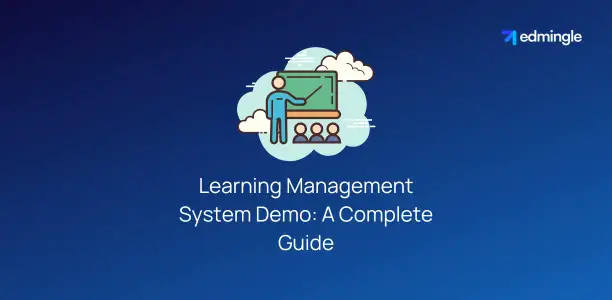
The quest for the perfect LMS can be challenging. But what if you could get a behind-the-scenes look before making a decision?
This is where a learning management system demo emerges as the unsung hero. Easing the decision-making process of navigating training challenges.
In this complete guide, we’ll explore in depth about an LMS demo & its true potential.
What is a Learning Management System Demo?
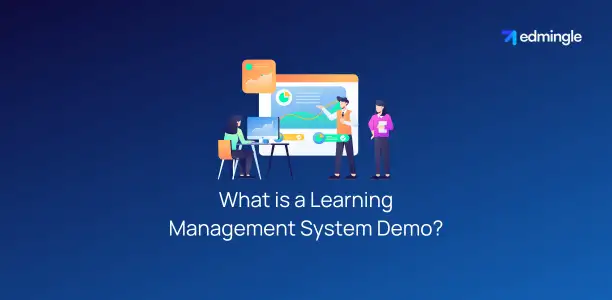
A learning management system demo is an invaluable feature. It basically offers a sneak peek into the inner workings of an LMS.
Thereby, allowing you to explore its features, interface and adaptability first-hand.
Think of it as a test drive. One that ensures whether the system aligns perfectly with your need and goals.
Understanding the essence of an LMS, before adoption, is the first step to success. This way, you are empowered to make informed choices.
Why is an LMS Demo Required?
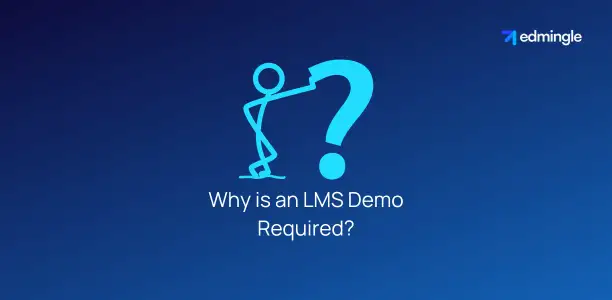
Today, before purchasing anything, we try it at least once. How does it work, how it feels, etc.
A smartphone, TV or even headphones. We need that hands-on experience. So, why should it be any different when it comes to choosing an LMS?
With an LMS demo, you can analyze whether the platform is suitable for your needs and objectives.
And consequently, a right LMS becomes the determinant of successful training operations.
Also Read: Best LMS Software in India.
LMS Demo Dos & Don’ts
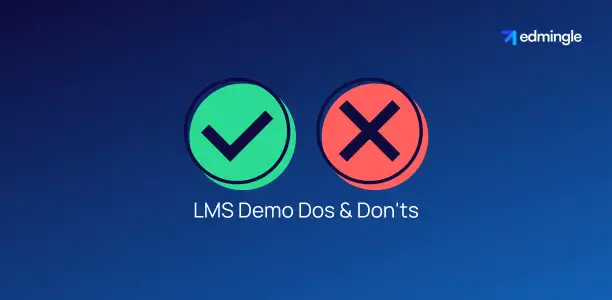
Having a sneak peek isn’t as simple as it seems like. Mainly because there are plenty of options today. And honestly, it can be overwhelming.
To ensure that you get it right since the beginning. We’ve compiled a list of essential dos and don’ts for the perfect experience.
DOs:
| Set Clear Objectives | Know what you are looking for. Is it the user experience, integration capabilities or reporting features? By having a clear checklist, you maximize its efficiency. |
| Engage Multiple Stakeholders | Gather feedback from various user groups. From instructors to students. Their diverse insights will ensure a holistic assessment of the platform. |
| Test Real-World Scenarios | Use actual course materials and learner data to simulate real teaching situations. This will provide a genuine feel for day-to-day operations. |
| Ask Questions | Whether it’s about technical glitches, customizations or support. Don’t hesitate to probe. Thus is your time to be curious and critical. |
If you’re just beginning on your online course creation journey. Our complete guide on how to create an online course might be super helpful to you.
DON’Ts:
| Get Distracted by Gimmicks | While shiny features can be enticing. Focus on your primary needs. A fancy add-on is pointless. If the core functionalities don’t align with your goals. |
| Rush the Process | An LMS is a long-term commitment. Don’t hurry through the process. Take your time to understand each feature and its potential impact. |
| Skip the Feedback Stage | After this, gather your internal team and discuss. What worked? What didn’t? This post-reflection is crucial for an informed decision. |
| Forget About Scalability | While an LMS might meet your current needs. Consider your future growth as well. Ensure that the platform can adapt and evolve as your educational courses/requirements expand. |
In the grand quest for the perfect LMS, the demo phase is your guiding star. And with these dos and don’ts in hand, you are not just reaching for the stars; you are aligning them in your favor.
Since we talked about core features a lot in this section. Here are the key features of an LMS.
5 Factors to Consider Before Taking an LMS Demo Presentation
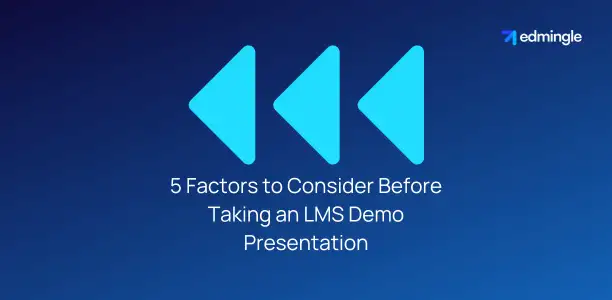
Before beginning your learning management system demo session. Follow this structured guide to ensure not missing out on any crucial aspect.
1.Understand Your LMS Objectives Clearly
Before you dive into a demo procedure. Have a clear understanding of your unique requirements. This ensures you evaluate learning solutions that align with your learning objectives/goals.
2.Make a List of LMS Demos You’d Like to Explore
Not all LMSs are created equal. Research and narrow down your options based on credibility, advanced features, and scalability. Before scheduling demo requests. Prepare this lost based on feedback from real users. Websites, forums, or specialized platforms can also offer customer reviews.
3.Request Additional Resources from Reputable Vendors
Always request supplementary materials. Like case studies, customer testimonials or detailed feature lists. This provides a comprehensive picture of the product beyond the demo step.
4.Schedule it at the Right Time, with the Right People
Initiating an LMS demo at the right time can set the tone right. Ensure that you’ve allocated ample time for a thorough evaluation. And that your team is ready for adoption. Make sure all your key decision influencers & stakeholders are available. Knowing their input ensures that diverse needs and perspectives are considered.
To book your free online demo with Edmingle, click here.
5.Get Ready Before the Session
| i.Outline Your Main Goals | ii.Prioritize Essential Features to Focus On | iii.Consider the Desired Appearance and Usability | iv.Understand Your Audience’s Preferences | v.Keep Your Budget Handy |
With these steps in hand. You are not just browsing an LMS demo. But strategically evaluating them.
6 Essential Features to Check for During an LMS Demo
Choosing the right learning management system can be a game-changer. And a live product demo is a great way to witness its capabilities.
Before making a commitment. To make the most of this opportunity. Ensure that you are looking out for these 6 essential features:
| 1.Assessments | A good LMS will empower online learners with online assessment tools. Look for additional features such as quizzes, surveys and feedback forms. Even microlearning features can be highly essential. These tools not only gauge comprehension but also provide invaluable feedback. |
| 2.Automation | It’s the age of the internet. Don’t let tedious tasks consume your time. Make the most of your efforts and boost productivity with automation. |
| 3.Security | Asses the LMS security features. Check for features like two-factor authentication, SSL certificates and data encryption. To ensure the platform’s reliability. |
| 4.White Labeling | Branding is crucial for many organizations. The LMS should allow you to customize its look and feel. For better brand image and recognition. To know more about it, check our blog on white label LMS platforms. |
| 5.User-Friendliness | A complicated interface can deter active users. Ensure the LMS has an intuitive and user-friendly graphic user interface (GUI). This makes navigation and access to resources effortless. |
| 6.Support | Lastly, ensure that the platform provides robust customer support and service. Whether it’s training your team to use the platform. Or troubleshooting technical issues. Having experts on standby can make a world of difference. |
By focusing on these 6 features. You’ll be informed wholly about an LMS’s capabilities.
11 Must Ask Questions During an LMS Demo
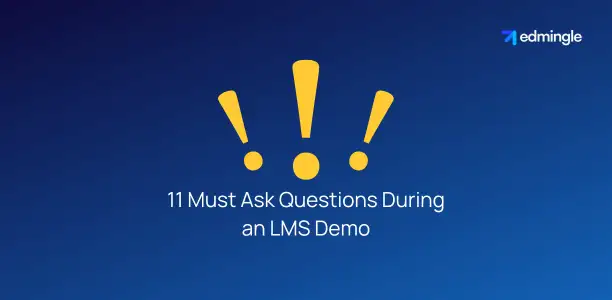
Going to join an LMS demo? Don’t tread lightly! Ask these questions to be armed with the best LMS for you.
- Is the system user-friendly for my L&D personnel?
- Will it address gaps in my current L&D tools?
- How secure will my information be?
- Can the LMS accommodate various languages?
- What kind of support and assistance comes with the package?
- Is the content compatible across different platforms?
- Are the analytical & reporting features satisfactory?
- Can it facilitate social learning or casual learning modules?
- Is the LMS scalable & adaptable to future requirements?
- Do the features justify the cost?
- Will it solve the regular hurdles I face?
When diving into LMS demos, keep these queries handy. Your future self, equipped with a perfect LMS, will surely thank you!
You might also like to read:
What to do After Getting an LMS Demo?
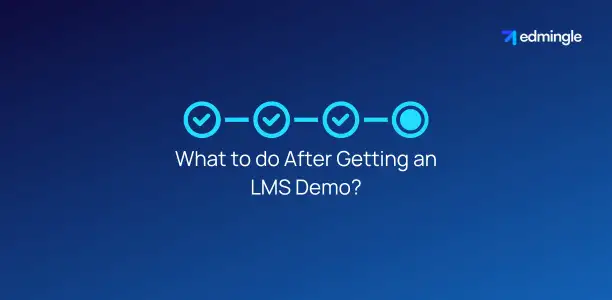
Assess the effectiveness of the learning management system demo.
Analyze how well the vendor representative showcased the system’s capabilities. How did they address your concerns and met your criteria.
If you’re satisfied, you can then move on to try it yourself with a free trial (if available).
Summary of LMS Demo
As we conclude this journey. It’s evident that the quest for the perfect LMS is both critical and delicate.
And behind a successful LMS selection. An LMS demo is a cornerstone in making an informed decision.
The hands-on experience, insights and understanding. Garnered from a well-conducted learning management system demo can illuminate the path towards choosing an LMS.
One, that not only meets but exceeds your educational and operational goals.
FAQs on Learning Management System Demo
1.Why is an LMS demo important?
An LMS demo allows organizations to understand. How the system can cater to their specific needs and assess its user-friendliness. All while evaluating its fit with their existing technological infrastructure. It helps in making an informed decision before implementing an LMS.
2.How do I request an LMS demo from a vendor?
Most LMS vendors like Edmingle have a ‘Schedule a Demo‘ button on their website. By clicking on it and filling out a form, you can set up a demo. Alternatively, you can contact their sales or customer care/support team.
3.Is there a cost associated with an LMS demo?
Generally, LMS demos are offered for free by vendors as they serve as a part of the sales process. However, it’s always a good idea to confirm with the vendor.
4.How long does a typical LMS demo last?
The duration can vary based on the vendor and the depth of the demo, but most LMS demos last between 30 minutes to 2 hours.
5.Can I try out the LMS on my own after the demo?
Many vendors offer a limited-time free trial version post-demo. Thus, allowing users to explore the LMS hands-on. It’s best to ask the company about trial availability during the demo.

Leave a Reply